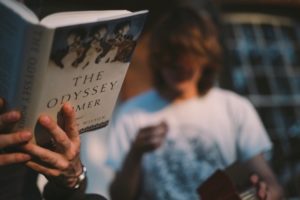
Modernizing an Ancient Epic
October 14, 2019 Ally Geoffray
Purdue’s English Department has created a new tradition involving faculty, students, and the local community. Each year, it selects a book to highlight as its “Big Read.” This year’s book is Emily Wilson’s new translation of The Odyssey, which unflinchingly depicts its protagonist’s ambiguous nature as both victim of fate and perpetrator of heinous deeds. Looking beyond the absolutely gorgeous white and blue, gilt-lettered cover, which features the three muses in glittering gold, this new translation of the classic epic proves itself a valuable contribution to an inundated market for this particular Greek legend of Odysseus’s homecoming after the Trojan War.
First and foremost, Emily Wilson rejects our stylistic assumptions about Homeric epic, the common belief that it must be rhetorically elevated and ostentatious, full of old-fashioned diction. She argues that, “of course, the English of the nineteenth or early twentieth century,” the kind of language we most closely associate with the poem, “is no closer to Homeric Greek than the language of today” (Wilson, 87). Similarly, while she invokes the original qualities of the epic by emphasizing its oral form through the use of repetition as a mnemonic device, she also provides an originality that many translations forgo. For instance, she introduces ingenious permutations for the stock phrases the poem employs, especially through multifarious epithets like “wily Odysseus, the lord of lies” (Wilson, 240). By using accessible language that allows for more a contemporary understanding, Wilson’s translation invites attention, providing opportunities for substantial interaction between the audience and the text, a feat that seems remarkably similar to the overarching intent of the Big Read program.
 Here is a piece of advice when acquainting oneself with this edition: do not skip the introduction! Although many readers have been exposed to some knowledge of this epic’s rich history, this nearly 80-page introduction includes a variety of intriguing information about topics such as the complex character of Odysseus, further background into the mystery of Homer, and actual geographic locations correlating to the different stops that Odysseus makes on his voyage homeward. It also includes a deeper look into ancient Greek gender roles and what it means to be a woman within this world—particularly some one of Penelope’s stature in contrast to women in other levels of the social hierarchy, such as the goddess Calypso or the slave women (who function as housekeepers, and as prizes to be looted when ransacking villages or during battle).
Here is a piece of advice when acquainting oneself with this edition: do not skip the introduction! Although many readers have been exposed to some knowledge of this epic’s rich history, this nearly 80-page introduction includes a variety of intriguing information about topics such as the complex character of Odysseus, further background into the mystery of Homer, and actual geographic locations correlating to the different stops that Odysseus makes on his voyage homeward. It also includes a deeper look into ancient Greek gender roles and what it means to be a woman within this world—particularly some one of Penelope’s stature in contrast to women in other levels of the social hierarchy, such as the goddess Calypso or the slave women (who function as housekeepers, and as prizes to be looted when ransacking villages or during battle).
One of my favorite scenes, found in Book 5, focuses on Odysseus’s stalled voyage home, as he sits, forlornly staring out to sea, trapped on Calypso’s island with little hope of return. He desires recognition from his family and the people of Ithaca for his numerous exploits and death-defying adventures; he needs this acknowledgement in order to maintain his powerful position within society. Rather than accept a peaceful and possibly eternal life marooned on Calypso’s island, then, our protagonist longs to return home to his wife, Penelope. Still, he must remain cautious in how he portrays this yearning, especially since he must avoid provoking the goddess Calypso with whom he currently resides. In this way, he displays his central quality, metis. Emily Wilson translates this trait, one highly valued within Greek culture, as “‘cunning,’ ‘skill,’ ‘scheming,’ or purpose’” (Wilson, 36). It aptly encapsulates Odysseus’ skillful maneuvers in his responses to Calypso, his making sure to acknowledge and emphasize her beauty as superior to his wife’s, despite his urge to leave her. He manipulates the situation adroitly, portraying himself as “a man whose mind was like the gods, who had endured many heartbreaking losses, and the pain of war and shipwreck” (Wilson, 319).
Another memorable scene involves Odysseus’s interaction with Polyphemus, the cyclops child of Poseidon. After arriving on the island, the ship’s crew admires the welcoming landscape, proclaiming that “there is flat land for plowing, and abundant crops would grow in the autumn; there is richness underground” (Wilson, 244). This rhapsodizing abruptly ends, however, as they wander into Polyphemus’s cave, the home of a cyclops who displays “no shame at eating [his] own guests” (Wilson, 255)! In perhaps Odysseus’s most cunning exploit within The Odyssey, this “master of plots and plans” cajoles Polyphemus into a state of inebriation only to drive an olive spear into his captor’s eye (Wilson, 240). The descriptions that Wilson employs here are gruesomely vivid, as she describes how “[Polyphemus’s] blood poured out around the stake, and blazing fire sizzled his lids and brows, and fried the roots” (Wilson, 252). Although Odysseus’s own hubris unravels his meticulous plot when he proclaims his true name to the blinded cyclops, the critical wound he delivers to Polyphemus’s only eye still serves as the monster’s punishment for severely perverting Grecian hospitality norms.
To be sure, an integral and recurring element throughout The Odyssey is the ancient Greek custom of xenia, “a word that means both ‘hospitality’ and ‘friendship’” (Wilson, 23). It involves generously welcoming of strangers into one’s home, providing them with a place of safety, a night’s rest, and a meal before any probing questions. Odysseus benefits from this custom frequently, with people choosing “to be kind to [him]… not for [his] stories, but in fear of Zeus, the god of strangers, and because [they] feel pity for [him]” (Wilson, 344). To modern day readers, the concept of inviting strangers, random wanderers, into one’s house might seem peculiar and even dangerous, but, in The Odyssey, this custom is expected and even necessary, or else the unwelcoming host may face divine punishment. Ultimately, then, the poem explores the Greeks’ responsibilities to and fears of welcoming the unfamiliar into their homes, their culture, and their personal experiences. Throughout her translation, Wilson invites the audience to listen and to think about xenia in their own lives. In today’s world—where borders and differences seem to define relationships among individuals—The Odyssey encourages us to interact with those of different backgrounds, accepting them as they are while seeking mutual understanding. Ultimately, then, by offering a nuanced view of the complicated hero, Odysseus, and also by discouraging fear of the perceived Other, Emily Wilson manages to reconstruct The Odyssey as “a text that allows us to explore our desire for power and permanence in a world of imagination, while also showing us the darker side of these deep human dreams, hopes, and fears” (Wilson, 74).
 Ally Geoffray is a junior in English Literature and Professional Writing at Purdue University.
Ally Geoffray is a junior in English Literature and Professional Writing at Purdue University.